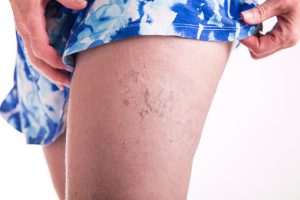 Everyone knows about varicose veins and everyone dreads them. Aside from the obvious aesthetic concern—bluish, unsightly, bulging veins aren’t particularly attractive—varicose veins spell discomfort, pain, and even dangerous health hazards like blood clots, ulcers, and deep vein thrombosis. The symptoms of varicosis extend beyond the visual symptoms. Patients commonly report itchiness, fatigue, swelling, and discomfort. Regardless of whether you have varicose veins or not, you’ve probably heard a lot about this condition. Let’s take a look at some common myths about varicose veins and try to find a grain of truth.
Everyone knows about varicose veins and everyone dreads them. Aside from the obvious aesthetic concern—bluish, unsightly, bulging veins aren’t particularly attractive—varicose veins spell discomfort, pain, and even dangerous health hazards like blood clots, ulcers, and deep vein thrombosis. The symptoms of varicosis extend beyond the visual symptoms. Patients commonly report itchiness, fatigue, swelling, and discomfort. Regardless of whether you have varicose veins or not, you’ve probably heard a lot about this condition. Let’s take a look at some common myths about varicose veins and try to find a grain of truth.
4 myths about varicose veins
Crossing your legs will give you varicose veins. This is probably the most well-known “fact” about varicosis. If there’s just one thing that you’ve heard about varicose veins, most likely this is it. For many people, sitting cross-legged is a matter of habit and comfort—so does it mean all of them are going to develop unsightly veins? The quick answer is no. The reason why veins bulge is because blood pools inside them and exerts pressure on the area. Because the culprit is in the vein itself, the pressure is internal, while crossing your legs exerts external pressure. According to Dr. James Bekeny, a vascular surgeon at Cleveland Clinic, the most likely cause of your varicose veins is defective valves or weakened vein walls. Sitting cross-legged does not cause varicosis, but it can aggravate the already existing condition.
Advertisement
If a relative has varicose veins, you will develop them too. Believe it or not, if your parents or grandparents suffered from varicose veins, it doesn’t automatically put you at risk. As you know, our cardiovascular and circulatory health is greatly affected by our lifestyle, which includes our occupation, our habits, and what we choose to do in our spare time. The National Heart, Lung, and Blood Institute found that only half of all people with unhealthy veins had a family history of the condition. So, if one of your relatives has varicose veins, there’s no reason to get alarmed—but there is a reason to take more care. Your genes do (somewhat) predispose you to vein problems, so if you suspect you may be at risk, review your lifestyle and make appropriate changes.
Varicose veins can be cured with massage therapy. Massage is a great way to release muscle tension and improve blood circulation; it’s a great way to relax and unwind too. But in spite of all its amazing benefits, massage therapy is not a cure-all when it comes to varicose veins. While a good massage can promote blood flow in the legs, many therapists actually choose not to massage bulging veins to avoid exacerbating the condition and only work through the proximal area instead. So far, injections and laser therapy have been proven to treat varicose veins and the associated symptoms.
You can’t tattoo over varicose veins. According to Dr. Bekeny, there is no relationship between varicosis and inking the affected area. Some people actually go for tattoos with the intention to cover their ugly veins. But while body ink may seem to be a great solution to the problem, this is usually not the case. First and foremost, ugly veins are not just a cosmetic concern. Even if you do succeed on the visual side, the deeper issue of pooling blood and unhealthy circulation is still there. And the bad news is, in many cases, the result does not meet the expectations. Tattooing over varicose veins often results in a distorted tattoo, ruptured veins, bleeding, or an infection. While there is no cause-and-effect relationship between tattoos and varicosis—and there isn’t necessarily a medical warning preventing you from getting a tattoo—body art is not a solution and comes with more cons than pros.
The more you know about a condition, the better you are equipped to prevent it and handle it correctly. Varicose veins are not the most pleasant thing you experience, but it’s not the end of the world. With proper care, you can safely manage the condition and even reduce the unsightly appearance. Good old methods such as keeping your weight within a healthy range and supplementing your diet with nutrients that can strengthen vein walls can, in fact, greatly benefit your legs—and your veins!
